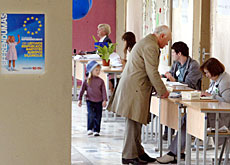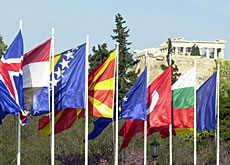EU asks Switzerland to expand labour accord

Switzerland has received an official request from the European Union to extend its accord on the free movement of people to include the new EU members.
The country’s 26 cantons and Swiss foreign policy committees are set to begin debating the issue, prior to its referral to parliament.
Chris Patten, the EU Commissioner for External Relations, appealed to Switzerland to continue its support of the EU’s enlargement.
In a letter to the Swiss foreign minister, Micheline Calmy-Rey, Patten also called on Bern to help finance the accession of the ten new member states, set to join in 2004.
The free movement accord is one of seven bilateral agreements between the EU and Switzerland, which is not a member of the 15-nation bloc.
Six of the accords, governing trade and transport issues, will automatically be extended to the new members when they join, but the labour accord needs to be negotiated with each individual state.
The Swiss cabinet on Wednesday gave the go-ahead for negotiations to start with the ten new member states.
Risks
The Swiss justice minister, Ruth Metzler, said extending the free movement of persons would be “a good opportunity” for the Swiss economy.
Metzler stressed that opening Swiss borders to the new member states would not lead to an influx of immigrants.
“We shouldn’t miss out on this opportunity by focusing on the risks,” Metzler said.
Wage dumping
On Tuesday, trade unions warned they would force a nationwide vote on the issue if the government failed to prevent wage dumping and a deterioration in working conditions.
This could delay the implementation of the new accord, which could otherwise come into force as early as January 2005.
The ten new members are Estonia, Lithuania, Latvia, Poland, Slovakia, Slovenia, the Czech Republic, Hungary, Cyprus and Malta.
swissinfo with agencies
The free movement accord is one of seven bilateral agreements between Bern and Brussels.
Six of the accords will automatically be extended to the new members once they join the EU.
However, the labour accord must be negotiated with each individual state.
If approved, the labour accord could come into force as early as January 2005.

In compliance with the JTI standards
More: SWI swissinfo.ch certified by the Journalism Trust Initiative


You can find an overview of ongoing debates with our journalists here. Please join us!
If you want to start a conversation about a topic raised in this article or want to report factual errors, email us at english@swissinfo.ch.